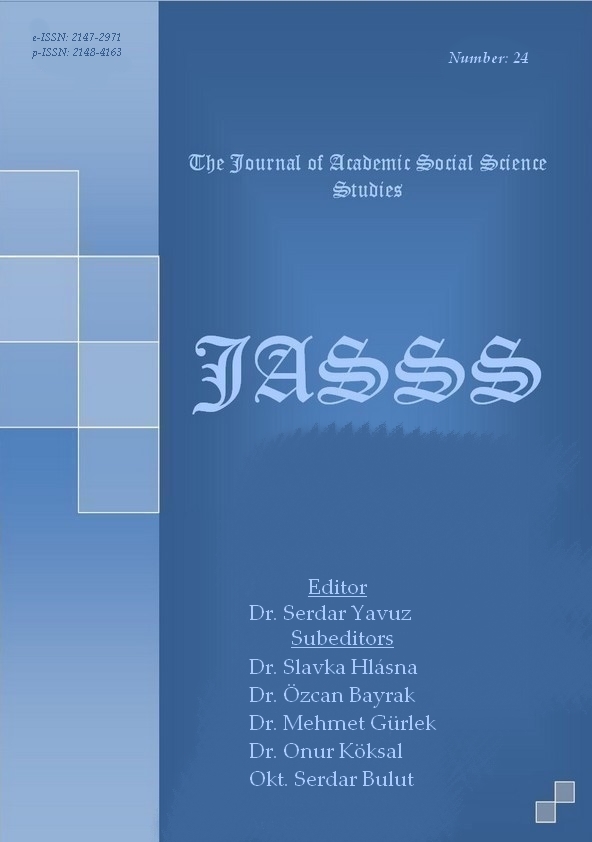POST-MİLLİYETÇİ AVRUPA BÜTÜNLEŞMESİ İÇİNDE AVRO-KUŞKUCULUĞUN ROLÜ: AVRUPA ÖZGÜRLÜK VE DEMOKRASİ GRUBU VAKA ANALİZİ
Author :
Abstract
Bu makalede Avrupa bütünleşme süreci yanında, post-milliyetçi boyutun bir parçası olduğu savunulan, Avro-kuşkuculuk kavramı üzerinde durulmaktadır. Makalede savunulduğu üzere hoşgörülü fikir birliği ya da müsaadeci fikir birliği olarak bilinen tezlerinin zayıflamasıyla ulusal ve yerel düzeydeki siyaset, Avrupa düzeyine ve alanına yayılmaya başlayan bir siyasal rekabete dönüşmüştür. Fakat makalede Avro-kuşkuculuk, Avro-istekli görüşe karşıt olmak bir yana, her iki görüşünde aslında siyasal çekişmeyi besleyen bir madalyonun iki yüzü olarak ele alınmıştır. Bu sebeple Avro-kuşkuculuk pro-Avrupacılık görüşünden ayrı değerlendirilmek yerine Avro-istekli görüş ile paylaşılan ve paylaşılmayan değerler veyahut kaygılar üzerinden ele alınmıştır. Makalede bu zıtlaşma yapıcı ve pozitif olarak değerlendirilirken bu hipotezi doğrulamak adına Avrupa Özgürlük ve Demokrasi grubu dikkate çekilmiştir. Vaka analizinde ele alındığı üzere Avrupa Özgürlük ve Demokrasi grubu, Avrupa Birliğini mutlak reddeden bir görüş içinde olmamakla beraber, Avrupa Birliği yönetişim biçimini (rejimi) eleştirmekte ve bunun sonucunda gelecekteki Avrupa senaryoları için önemli olan demokratik gereklilikleri – dâhil olma, katılım gösterme, yanıt üretme – yerine getirmek adına bu denklem içinde önemi giderek artmaktadır. Avrupa Özgürlük ve Demokrasi grubu geleneksel ulusal anlayış dışına taşan tutumları ve bunun sonucunda post-milliyetçi siyasal çekişmenin önemli bir parçası haline gelen ve zaman zaman katı bir muhalefet içinde zaman zaman ise direnç ve baskı gösteren bir hareket içinde ele alınmıştır.
Keywords
Abstract
The article focuses on the concept ‘Euroscepticism’, as a part of an evolving post-national dimension, alongside the European integration. As argued in this article, the death of the permissive consensus has directly opened up the domestic political spaces to a European-wide political contestation. However, Euroscepticism is not handled contrary to Euro-enthusiasm in this article solely, but both are evaluated as the two sides of the same coin feeding the political contestation in Europe. That is why Euroscepticism is not segregated from pro-Europeanism, but rather separated by the concerns shared or not shared with that of Euro-enthusiasm. The article emphasizes this antagonism as constructive and positive and for testing this hypothesis the article concentrates on the Europe of Freedom and Democracy group. As outlined in the case study, the Eurosceptic Europe of Freedom and Democracy group is not into an absolute denial of the EU, but approaching critically the EU governance structures (regime) as a result becoming an important part within this equation for fulfilling the democratic requirements in a way of– inclusiveness, participation and responsiveness- all urgently required for future European scenarios. The Europe of Freedom and Democracy group is acknowledged as a movement in opposition, resisting and/or pressuring the developments at different levels and scope, which exceeds the traditional national understanding, as well as becoming an important part of the post-national political contestation.





